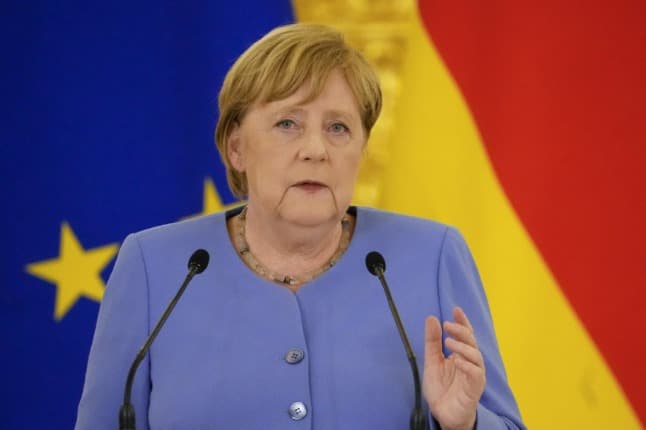German Chancellor Merkel visits Ukraine before leaving office

German Chancellor Angela Merkel is visiting Ukraine on Sunday, an ally she has supported in its conflict with pro-Russia separatists but has disappointed with her appetite for Russian gas.
She is due to meet with President Volodymyr Zelensky just two days after holding talks with his Russian counterpart Vladimir Putin in Moscow ahead of her departure from office next month.
READ ALSO: End of an era: Merkel to meet Putin in final state visit to Russia
In power for 16 years, the German leader has been a key ally of Kiev since 2014, when Moscow annexed Crimea and pro-Russia separatists broke away from Ukraine in the east.
But she has also been unwavering in pushing across the finish line a controversial Russian gas pipeline to Europe despite fierce opposition from Ukraine, the United States and several European countries.
"You can call it a pragmatic approach," Zelensky said this week in an interview with several media outlets, adding that Merkel was conducting a "very delicate balancing act".
"In my opinion, this is too soft."
READ ALSO: Germany set to finish controversial gas pipeline despite US protest
Despite disagreements over the pipeline, Germany is a key mediator in attempts to resolve the protracted conflict in eastern Ukraine, which has claimed more than 13,000 lives.
Since the fighting broke out, Merkel has been one of the loudest voices accusing the Kremlin of backing the separatists, which Moscow denies.
And she played a crucial role in clinching the Minsk peace accords in 2015, which helped halt the fiercest clashes.
But for many in Ukraine, the deal, which assumes some autonomy for the breakaway parts of the Donetsk and Lugansk regions, was unfavourable for Kiev and is difficult to fulfil.
"With Merkel's departure, the foundation of the Minsk agreements will become even more fragile," Kiev-based political analyst Volodymyr Fesenko told
AFP.
Comments
See Also
She is due to meet with President Volodymyr Zelensky just two days after holding talks with his Russian counterpart Vladimir Putin in Moscow ahead of her departure from office next month.
READ ALSO: End of an era: Merkel to meet Putin in final state visit to Russia
In power for 16 years, the German leader has been a key ally of Kiev since 2014, when Moscow annexed Crimea and pro-Russia separatists broke away from Ukraine in the east.
But she has also been unwavering in pushing across the finish line a controversial Russian gas pipeline to Europe despite fierce opposition from Ukraine, the United States and several European countries.
"You can call it a pragmatic approach," Zelensky said this week in an interview with several media outlets, adding that Merkel was conducting a "very delicate balancing act".
"In my opinion, this is too soft."
READ ALSO: Germany set to finish controversial gas pipeline despite US protest
Despite disagreements over the pipeline, Germany is a key mediator in attempts to resolve the protracted conflict in eastern Ukraine, which has claimed more than 13,000 lives.
Since the fighting broke out, Merkel has been one of the loudest voices accusing the Kremlin of backing the separatists, which Moscow denies.
And she played a crucial role in clinching the Minsk peace accords in 2015, which helped halt the fiercest clashes.
But for many in Ukraine, the deal, which assumes some autonomy for the breakaway parts of the Donetsk and Lugansk regions, was unfavourable for Kiev and is difficult to fulfil.
"With Merkel's departure, the foundation of the Minsk agreements will become even more fragile," Kiev-based political analyst Volodymyr Fesenko told
AFP.
Join the conversation in our comments section below. Share your own views and experience and if you have a question or suggestion for our journalists then email us at [email protected].
Please keep comments civil, constructive and on topic – and make sure to read our terms of use before getting involved.
Please log in here to leave a comment.